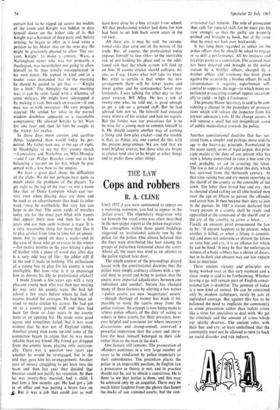Cops and robbers
THE LAW R. A. CLINE
Until 1952 if you were summoned to appear on a motoring summons, you had to appear in the 'police court.' The stipendiary magistrate who sat beneath the royal arms was often described in the newspaper report as the police magistrate. The atmosphere within those gaunt buildings suggested an institutional activity run by the police for the police. One almost believed that the fines were distributed like loot among the groups of policemen festooned about the court. Above all, the court was sited as an adjunct to the police station next door.
The whole context of the proceedings played havoc with the constitutional doctrine that the police were simply ordinary citizens with a spe- cial duty to arrest and bring to justice, that the courts were impartial adjudicators between one individual and another. Statute has changed many of these features by altering a few names —police courts are now 'magistrates' courts' —though shortage of money has made it im- possible to resite the courts away from the police stations. An attempt is now being made to relieve police officers of the duty of acting as ushers in these courts, for their presence, how- ever helpful and courteous (or where necessary discourteous and strong-armed), conveyed a powerful impression that the court and there- fore the beak himself belonged to their side rather than to the man in the dock.
One feature still remains. The prosecution of offenders continues in a very large number of cases to be conducted by police inspectors 'or their subordinates. The procedure places the police in an impossible position. In English law a prosecutor in theory is not, and in practice should not be, out to obtain a conviction. He is there to see that justice is done, and this may be achieved only by an acquittal. There may be much bitter laughter from the ghosts that haunt the docks of our criminal courts, but the con-
stitutional fact remains. The role of prosecutor thus calls for especial skill, for he must put his case strongly so that the guilty are properly probed and brought to book, but at the same time he must not lean over backwards.
It has long been regarded as unfair on the police officer that he should be asked to engage in so deft a performance. All his instincts and loyalties point to a conviction. The accused man has been detected and brought to the police station by a brother officer, charged by a brother officer and testimony has been given against the accused by a brother officer. In such circumstances it requires superhuman self- control to suppress the urge—to which many ex- perienced prosecuting counsel appear occasion- ally to yield—to fight a toutrance.
The present Home Secretary is said to be con- sidering a change in the procedure of prosecu- tions which will release the inspector from his present advocate's role. If the change occurs, it will remove a small but not insignificant cause of public malevolence towards the police.
Another constitutional doctrine that has sur- vived from a simpler and perhaps more orderly age is the have-a-go principle. Formulated in the more stately terms of legal jargon, this prin- ciple makes it the duty of any person who has seen a felony committed to raise a hue and cry and, probably, to aid in arresting the felon. The law is not at all clear about this duty which has survived from the thirteenth century. At that time raising hue and cry meant reporting to the sheriff of the county or the constable of the town. The latter then levied hue and cry: that is, shouted aloud calling on all able-bodied men over the age of fifteen to pursue the offender and arrest him. It then became their duty to join in the pursuit. In 18p a statute declared that 'every person in a county shall be ready and apparelled at the command of the sheriff and at the cry of the country to arrest a felon, . . Finally an eminent jurist pronounced the law to be: 'if anyone happens to be present, when another is killed, or when a felony is commit- ted, and does not intervene or disturb the felons or raise hue and cry, it is an offence for which he can be fined.' It may be that the unfortunate witness of a bank robbery has a choice of duties, but in its dark and obscure way our law expects him to intervene.
These ancient statutes and principles are being worked over at this very moment and a clean sweep is said to be forthcoming. Whether having a go will remain part of English consti- tutional law is doubtful. The gunman of today is, a new kind of animal. He can be contained only by modern techniques, rarely by acts of individual courage. But against this has to be balanced the need to implicate the community in crime prevention rather than isolate crime like a virus for specialists to deal with. We get the criminals and the amount of crime which our apathy deserves. The ancient rules, with their hue and cry, at least underlined that the community must not be allowed to turn its back on social disorder and run indoors.






























 Previous page
Previous page